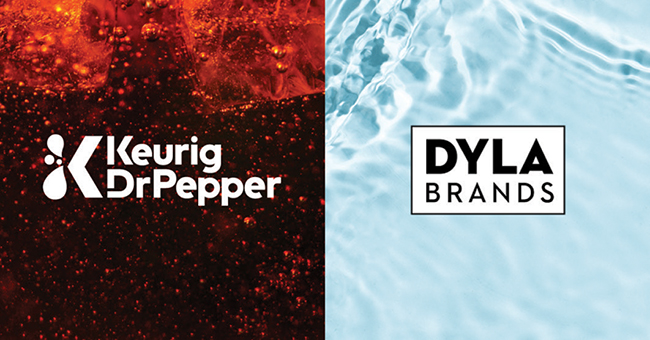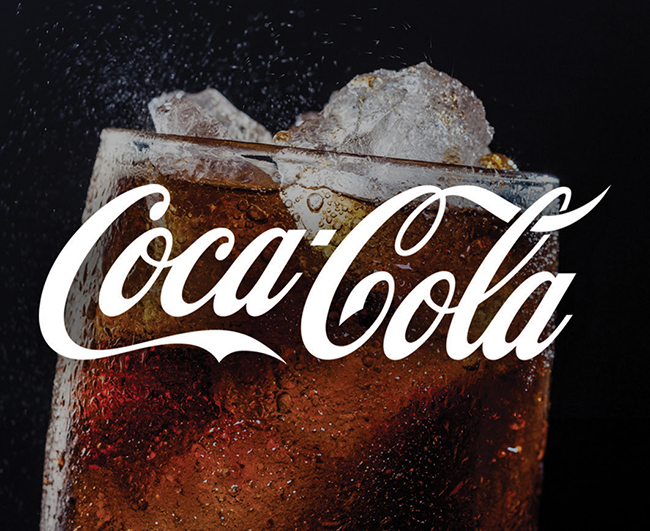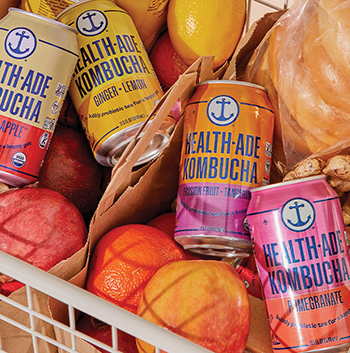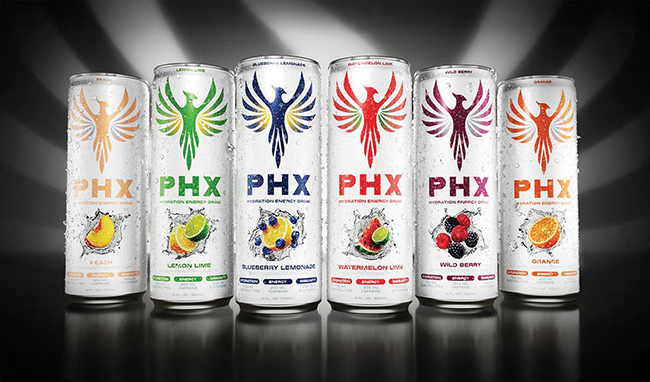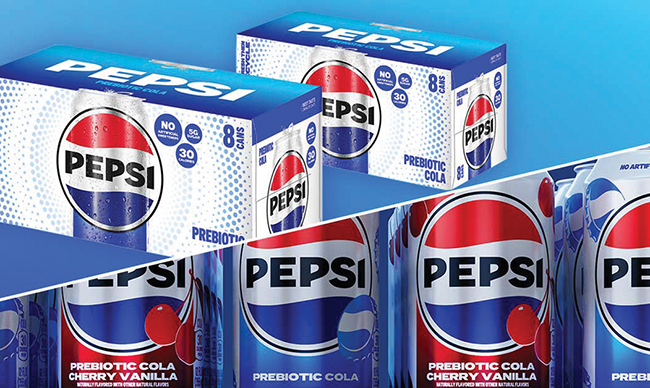Bevscape: The Latest Beverage Brand News
Keurig Dr Pepper Acquires Dyla Brands
Keurig Dr Pepper (KDP) acquired drink mix manufacturer Dyla Brands, which produces Stur and a growing portfolio of co-branded liquid and powder mixes, the company announced during Q2 earnings call in July.
Financial terms of the deal were not disclosed.
KDP was previously a minority stakeholder in Dyla and held a seat on the company’s board of directors. Beginning around 2020, the company began licensing a number of its portfolio brands to Dyla to create drink mixes, including products like Hawaiian Punch, Crush Orange Soda, 7-Up, A&W Root Beer, Snapple and C4 Energy.
The acquisition provides KDP with 100% ownership of the business.
The deal, however, does not include the Happy Viking protein powder brand developed in partnership with Venus Williams, which will be spun out and continue as an independent business.
Speaking to BevNET, Dyla founder and CEO Neel Premkumar said that the company will continue to operate independently for the foreseeable future with all staff expected to remain in their current roles, but KDP’s ownership will provide an even bigger opportunity to expand the business in retail.
“We’ve just kind of consistently been growing every year, and it got to a meaningful size for them,” Premkumar said. “The category itself is on fire – the water treatment category is now about $4 billion and we do over 1.5 billion servings a year.”
According to Circana, U.S. retail dollar sales of Stur brand drink mixes were up 4.3% to about $16.6 million in MULO and c-store for the 52-week period ending April 20, 2025. However, that’s only a fraction of Dyla’s total business, which also includes online sales with a constant stream of LTO launches, and a growing slate of licensed products with non-KDP aligned brands as well.
Premkumar said that in recent months, Dyla has been producing mixes for brands like Sparkling Ice, Dole and Ocean Spray.
Dyla also recently took over production of Liquid Death’s powdered Death Dust line. Launched last year, Death Dust suffered initially from a poor manufacturing run with less-than-desired quality. Now, Dyla has created a “restaged version” rolling out in July, Premkumar said. The updated line includes 1,000 mg of electrolytes, reduced sugar, “boosted flavor” and a reduced price point.
Under KDP ownership, Premkumar said, the conglomerate is now looking at how it can work to scale Dyla’s distribution, particularly with its ability to secure more off-shelf placements, noting that “there are some channels and even the existing retail relationships that we already have, strong ones, where they’ve got levels above, deeper connections.”
As well, Dyla will be “looking at more and more of their trademarks,” he said.
Coke Responds To Trump’s Appeal, Set to Launch Full-Sugar Sub-Line
For those who wondered whether President Donald J. Trump’s announcement in July of a full-sugar formula meant that Coke had experienced some kind of full MAHA conversion, this news pointed more towards a new denomination.
Coke CEO James Quincey told analysts on the company’s second quarter earnings call on July 23 that the company would be launching what amounted to a full-sugar line extension, rather than a complete formula change, as some believed Trump had indicated.
“As part of its ongoing innovation agenda, this fall in the United States, the company plans to launch an offering made with U.S. cane sugar to expand its Trademark Coca-Cola product range,” Coke noted in its current 8-K filing with the SEC. “This addition is designed to complement the company’s strong core portfolio and offer more choices across occasions and preferences.”
Many U.S. consumers already have access to cane sugar versions of Coca-Cola through “Mexican Coke,” a version imported from Mexico.
Robert F. Kennedy Jr., Trump’s Health and Human Services secretary, has campaigned against the widely-used CSD sweetener high fructose corn syrup; he has also campaigned against sugar consumption overall. Coca-Cola responded by defending its use of corn syrup, citing it as “safe” and as being metabolized by the body in the same manner as table sugar.
Health-Ade Selling to Generous Brands for $500 Million
Health-Ade’s investors are selling the company to Generous Brands, a portfolio company of private equity firm Butterfly Equity, for approximately $500 million.
“With its purpose-led brand and products that are positioned at the intersection of delicious taste and modern health trends, Health-Ade fits perfectly into our platform and growth strategy, said Generous Brands CEO Steve Cornell in a statement. “This exciting addition to the Generous Brands portfolio will accelerate our mission of inspiring more people to thrive through the power of vibrant nutrition.”
The kombucha brand, founded by husband-and-wife team Justin and Daina Trout and Vanessa Dew, has long been the major alternative to category leader GT’s.
Health-Ade sold $182 million in kombucha over the past 52-week period ending June 15 – up 8% from the previous 52-week period, according to data from retail information group Circana, good for a 24% share of the refrigerated kombucha category. GT’s was at close to $340 million in the same category. Both brands have other products; Health-Ade’s SunSip is intended to compete with prebiotic “Modern Soda” brands like Poppi, Olipop, and Culture Pop.
Generous Brands, a platform that includes Bolthouse and Evolution Fresh juices, as well as manufacturing for açaí brand Sambazon, has been pushing to acquire Health-Ade for more than a year. Health-Ade has long been rumored to be on the market, with CEO Chris Lansing brought in at the end of 2022 to accelerate growth and make it a more appealing sales target.
“This announcement marks a natural evolution in Health-Ade’s journey and an exciting milestone for the premium refrigerated beverage category,” Lansing said in a statement. “Health-Ade and Generous Brands are aligned in their unwavering commitment to delivering exceptional taste while prioritizing clean, nutritious ingredients. We are excited and confident that Generous Brands is the right platform to unlock Health-Ade’s full potential and introduce even more people to the power of gut-healthy beverages. We are grateful to our founders who helped pioneer this category, and to First Bev and Manna Tree for their support and partnership to help us grow to where we are today.”
Both First Beverage and Manna Tree Partners, Health Ade’s primary investors, will maintain stakes in the company as shareholders in Generous Brands, according to a statement from the company.
With the acquisition, the Generous Brands portfolio will have nearly $1 billion in retail sales, the company said.
Barstool Sports Owner Dave Portnoy Backs PHX Energy Drink Launch
Barstool Sports boss Dave Portnoy is taking a starring role in the launch of PHX, a new 12 oz. canned line that aims to marry hydration and energy drinks.
The brand, pronounced “phoenix,” is the first product launch from Florida-based startup One 11 Brands, a new venture headed by former AB InBev senior VP Daniel Blake. The new line aims to marry hydration, immunity and energy, combining 200mg caffeine, 100% daily value of eight vitamins, and 700mg of electrolytes from a blend of sodium, potassium, magnesium and calcium.
PHX launched in July in New York, Massachusetts and Ohio, and is available in Peach, Lemon Lime, Watermelon Lime, Blueberry Lemonade, Wild Berry and Orange.
Portnoy, best known for his “One Bite” pizza reviews, and the Barstool media network have dabbled in beverages previously, through both official partnerships and organic support. Portnoy notably helped to personally promote and popularize High Noon vodka seltzers, including the release of a themed variety pack and a charity initiative. Meanwhile, Barstool has previously signed media sponsorship deals with brands like Phusion Projects, Proper Wild, Owen’s Craft Mixers and Revitalyte.
In this case, Portnoy has joined as a marketing partner and does not have a financial stake in PHX or One 11. Details were scant but PHX says he’s set to “play an instrumental role in the brand’s growth and boost awareness and visibility,” presumably through his 5.6 million followers on Instagram.
“People count on me to be straight with them, so I only get behind products I really believe in,” said Portnoy in a statement. “PHX is legit. It keeps you going when you’re grinding it out and tastes better than the competition. Daniel and his team have nailed it with something different here. I’m all in.”
PHX marks Blake’s first effort as an independent entrepreneur, having spent 10 years in AB’s marketing department working on both import and mainstream domestic beer brands. He departed in 2023 to launch One 11 Brands as an incubator for functional beverages, though the concept of PHX was developed internally after Blake’s market research led him to home in on functionality
and branding.
Within the energy category, Blake said he identified hydration, ‘clean’ caffeine and immunity as three in-demand functional benefits consumers were demanding. And on the shelf, he sees white space for a “co-ed” brand that threads the needle between female-skewing and male-centric competitors. The logo and brand name are meant to reflect “overcoming challenges” of all types, and that theme will be incorporated into “a lot of the storytelling we’ll be doing as we launch,” with college athletes being one point of initial focus.
“I felt there was an opportunity for a brand to really be kind of squarely in the co-ed space, maybe skewing slightly more masculine, but that offered this compelling, functional proposition with a clear point of view and a role that it could play in consumers’ lives,” Blake said.
PHX is launching through a handful of DSD wholesalers, starting with Heidelberg Distributing in Ohio, Manhattan Beer in New York, and Quality Beverage in Massachusetts. Beer distributors from the Anheuser-Busch and Miller Coors networks have been key partners in building next-gen energy brands like Bang, Celsius, Ghost and others into major players, but have also suffered when those brands exited their portfolios.
“For most of these wholesalers, they have the experience and the knowledge on how to grow energy drink brands, but they don’t have the brands in their portfolio today to kind of support that knowledge. We believe Phoenix is going to come in and fill that void in their portfolios,” Blake said.
Blake hopes this is just the beginning for One 11 Brands. While PHX is the immediate focus, the group is also exploring product concepts in categories like modern soda and adult non-alcoholic drinks.
“Our goal is to build a full portfolio of non-alc functional beverage brands in the future,” he said.
Pepsi Announces New Prebiotic Cola Launching Online This Fall
Just months after spending almost $2 billion to enter the gut-health soda category through its acquisition of poppi, PepsiCo announced it was launching its own prebiotic carbonated soft drink with Pepsi Prebiotic Cola, a new two-SKU line featuring three grams of prebiotic fiber per 12 oz. can that is set to launch on Black Friday in November.
Launching in Original Cola and Cherry Vanilla flavors, Pepsi Prebiotic contains 5 grams of cane sugar, 30 calories and no artificial sweeteners. The product will debut online during the Black Friday and Cyber Monday shopping holidays before kicking off a national retail launch in early 2026. It will be sold in single cans and 8-packs.
“From the iconic blue can, to the consumer-preferred Pepsi Zero Sugar, our portfolio has always adapted to the needs and flavor preferences of the consumer,” said Ram Krishnan, CEO, PepsiCo Beverages U.S. “Pepsi Prebiotic Cola represents the next leap forward in giving consumers choice, optionality and functional ingredients in their cola experience, without sacrificing the iconic Pepsi taste we’re known for delivering. We can’t wait for the world to try the taste of Pepsi Prebiotic Cola for themselves!”
The announcement represents Pepsi’s latest attempt to modernize its flagship soda roster which, other than logo and design changes, has been relatively unchanged since the introduction of Pepsi Zero Sugar in 2007. In late 2024, Pepsi teased the launch of a product called Soulboost Soda, featuring prebiotics from soluble corn fiber and sweetened with both juice and stevia. That innovation never reached the market, though.
With poppi, Pepsi acquired a mature category-leading brand (alongside Olipop) with strong awareness, distribution and momentum. Launching its own prebiotic soda may allow for greater pricing flexibility and marketing strategies, and capitalize on the strong performance of trademark Pepsi cola, as highlighted in the company’s most recent earnings report.
Pepsi’s chief rival Coca-Cola launched its own prebiotic soda under the Simply banner earlier this year.


Receive your free magazine!
Join thousands of other food and beverage professionals who utilize BevNET Magazine to stay up-to-date on current trends and news within the food and beverage world.
Receive your free copy of the magazine 6x per year in digital or print and utilize insights on consumer behavior, brand growth, category volume, and trend forecasting.
Subscribe